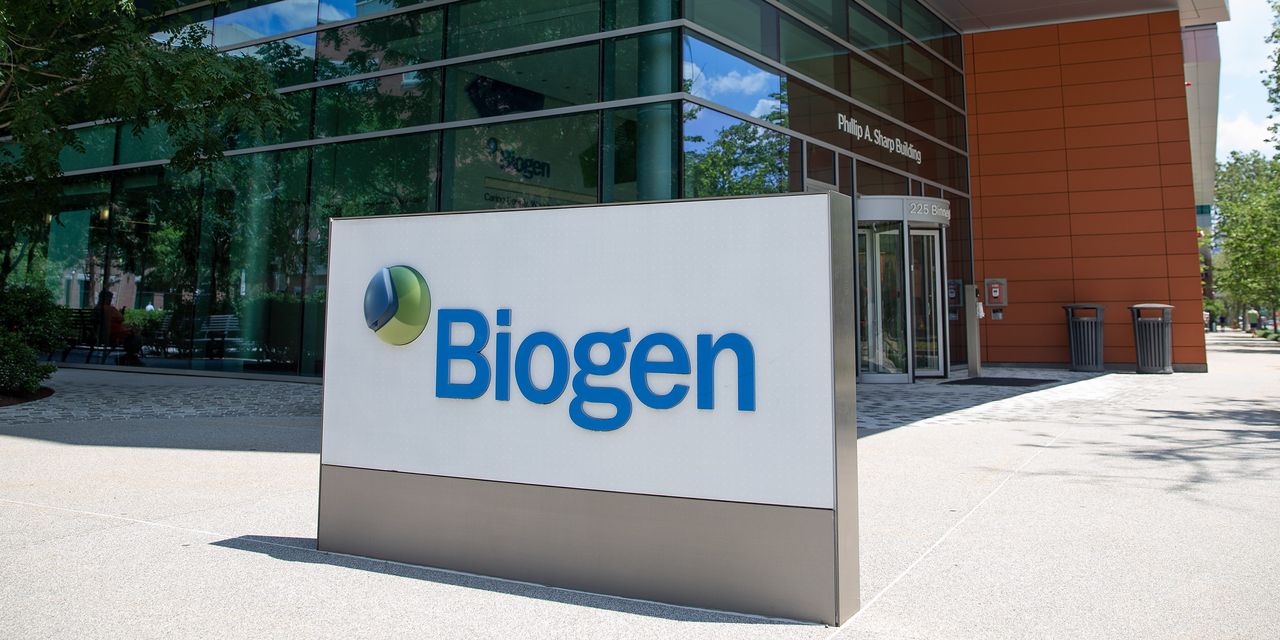
Medicare officials said they would cover Biogen Inc.’s BIIB 2.64% controversial Alzheimer’s disease drug Aduhelm on the condition that patients are in clinical trials and have early-stage symptoms.
The clinical trials are intended to gather evidence on the drug’s safety and effectiveness and would apply to similar drugs if they are approved, the Centers for Medicare and Medicaid said in a proposed policy issued Tuesday.
Patients enrolling in trials supported by the National Institutes of Health would also be eligible for coverage, according to CMS’s draft policy.
CMS said the Aduhelm studies must limit enrollment to patients in the early-stages of disease and have lab tests confirming that their brains have accumulated amyloid, a sticky protein linked to Alzheimer’s disease that Aduhelm is designed to clear. Medicare would pay for a single brain-amyloid scan under the policy.
A final decision is expected in April following an additional 30-day comment period in which members of the public can weigh in on the proposed coverage policy.
Aduhelm has the potential to help patients with Alzheimer’s, but also has the “potential for serious harm” because of its risk of side effects, which include headaches and small brain bleeds, said CMS Chief Medical Officer Lee A. Fleisher at a press briefing.
Biogen criticized the proposed coverage policy, saying in a statement that it “denies the daily burden of people living with Alzheimer’s disease” and “will exclude almost all patients who may benefit.”
The company also said the policy would delay treatment for a progressive disease. “Hundreds of Alzheimer’s patients—the majority of whom are Medicare beneficiaries—are progressing each day from mild to moderate disease stages, where treatment may no longer be an option,” the company said.
Medicare’s requirement that patients receive treatment in clinical trials reflects the lingering uncertainty about Aduhelm’s true benefit to patients. Biogen prematurely halted its studies of the drug in 2019. Biogen executives soon after analyzed additional data and realized they had made a mistake and began talks with the Food and Drug Administration to salvage the trial data and ultimately seek approval.
Of the two studies, only one showed patients taking Aduhelm had a slowing in cognitive decline compared with patients receiving placebos. The conflicting results led to ongoing debate over whether the drug really works. As part of the FDA approval, Biogen and its partner Eisai Co. Ltd. are required to conduct an additional study as well.
Aduhelm has faced widespread criticism since its approval in June, in part because concerns that its price would balloon Medicare drug spending if millions of patients start taking it. This year, Medicare premiums for doctor benefits jumped nearly 15%, with about half of the increase caused by the need to pay for Aduhelm, according to CMS actuaries.
Biogen initially launched the drug at an average price per patient of $56,000 annually, but recently backtracked and slashed the list price in half to $28,200.
Some lawmakers including Sen. Bernie Sanders (I-Vt.) and Sen. Ron Wyden (D., Ore.) have asked the Biden administration to reassess the Medicare premium increases following Biogen’s price cut.
Ronald C. Petersen, director of the Mayo Clinic Alzheimer’s Disease Research Center, who has consulted for Biogen in the past, said the coverage policy would be a good compromise, allowing for at least some patients to receive treatment while helping to answer hotly contested scientific questions.
“What they’ve outlined here is a structured means of gathering important clinical data on the utility of this class of drugs,” Dr. Petersen said. “The million dollar question is, is it clinically efficacious?”
Still, the policy could mean that it won’t be easy for many patients to receive treatment if they live in an area where there isn’t an eligible clinical trial, he added.
“‘The million dollar question is, is it clinically efficacious?’”
CMS officials said it would be up to “stakeholders” such as doctors and clinics to devise clinical trials that meet the agency’s requirements if they want to receive Medicare reimbursement. Biogen’s planned confirmatory trial could also be eligible for acceptance by CMS, said Tamara Jensen, director of the CMS coverage and analysis group.
The policy wouldn’t necessarily require studies to have a placebo arm, a CMS spokesman said.
Medicare coverage is crucial for Aduhelm’s future because most of the patients eligible to take it are covered under the federal health program for people over 65 years and the disabled.
Also, many private health insurers take their cues about whether to pay for medicines from Medicare’s coverage policies.
The policy has important implications for other companies, such as Eli Lilly & Co., that are developing amyloid-clearing drugs that could come on the market in the years to come.
Biogen shares fell 7.3% in after-hours trading on Tuesday; Lilly shares fell 1.7%.
Aduhelm has had scant uptake since the FDA approved it in June 2021 despite opposition from a panel of outside advisers and some of the agency’s own scientists and senior leaders.
Without a national coverage decision, Aduhelm coverage requests are currently handled on a case-by-case basis by regional contractors that administer benefits on behalf of the government. That will remain the case until Medicare issues a final coverage policy, a Biogen spokeswoman said.
Many doctors and hospitals have opted to wait for Medicare’s decision before prescribing and administering Aduhelm, which requires monthly intravenous infusions administered by a healthcare professional.
Part of the hesitancy is that Aduhelm is a “buy and bill” product that hospitals or clinics purchase and pay for upfront, and then seek reimbursement later from patients’ insurance after they have been infused with the medication.
Hospitals are reluctant to provide expensive drugs like Aduhelm if they aren’t sure they will get paid back.
Meanwhile, some hospitals have said they won’t provide the drug at all, citing uncertainty about its safety and effectiveness.
The FDA cleared Aduhelm’s use under a special process called “accelerated approval” intended to help patients with serious diseases get promising new drugs faster and before they are definitively proved to be effective in clinical trials.
The FDA has said that it used the accelerated approval process for Aduhelm because of lingering uncertainty about its benefit to patients. The agency is requiring Biogen to complete an additional study to confirm its effectiveness; if the study fails, the agency can theoretically pull the drug off the market.
Biogen’s Aduhelm
More coverage of the new Alzheimer’s disease treatment, selected by the editors
Write to Joseph Walker at [email protected]
Copyright ©2022 Dow Jones & Company, Inc. All Rights Reserved. 87990cbe856818d5eddac44c7b1cdeb8








